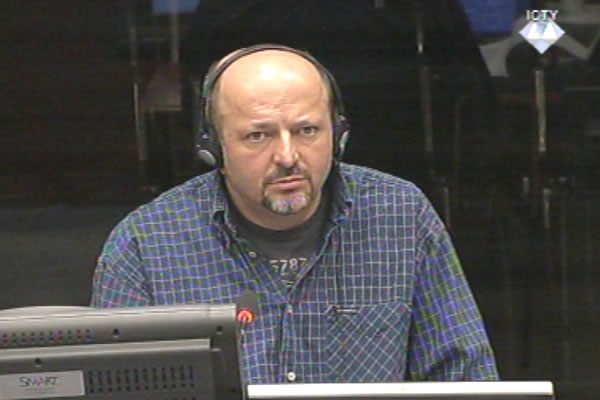Home
STAKIC: CRIMES AND FORCIBLE EXPULSIONS OF PRIJEDOR INHABITANTS ARE A FACT
In his evidence at Karadzic’s trial, Milomir Stakic expressed his regret for the things done to the non-Serbs in Prijedor. ‘It is a fact that the crimes were committed, a fact that they were expelled and forced to leave Prijedor’, admitted Stakic. However, Stakic denied his role in the crimes arguing that he ‘lacked political skills’, was a ‘pacifist’ and ‘powerless’
 Milomir Stakic, witness at the Radovan Karadzic trial
Milomir Stakic, witness at the Radovan Karadzic trial Former president of the Prijedor municipality and crisis staff Milomir Stakic said in his statement to Radovan Karadzic’s defense that ‘Muslims and Croats lived together with Serbs in the Prijedor region during the entire war’, and that the ‘Serb authorities didn’t have a plan to create a monoethnic state’. Stakic also stated that he had met with Karadzic several times during the war and ‘never heard him advocate the deportation of Muslims and Croats and the creation of a monoethnic Serb state’.
Stakic, sentenced by the Tribunal for persecution, extermination, murder and deportation of non-Serbs in 1992, is serving his 40-year sentence in France. In his statement to Karadzic’s defense Stakic said he knew of only two crimes committed by the Serb police and military against the non-Serbs in the Prijedor area – the massacre of prisoners in Keraterm and the execution on Koricanske Stijene.
Replying to prosecutor Katrina Gustafson, Stakic claimed that he wasn’t ‘trying to deny the crimes’ and expressed his ‘deep regret for the things done to the non-Serb citizens in Prijedor’. In Stakic’s view, he was not a ‘big or a key player’ in it. At the time, Stakic noted, he was only 29 years old, an ‘inexperienced medical doctor, lacking political skills and naïve’. As the president of the municipality and the crisis staff, he wasn’t in charge of the army and the police and couldn’t exert any pressure on them, Stakic explained. Stakic couldn’t do anything but resign.
In his statement, Stakic said that Simo Drljaca, the police chief in Prijedor, told the Crisis Staff members to ‘do their job’ and ‘not to interfere with his job’. This prompted the prosecutor to confront the witness with a document dated 1 July 1992 in which Drljaca says that the Crisis Staff’s decision to prohibit the release of the prisoners was complied with fully. Stakic first said that the decision was an ‘appeal’ to the police and the security officers in Keraterm and Trnopolje to prevent the taking out and killing of the prisoners. The Crisis Staff had received reports about such incidents.
Since Stakic denied that the Crisis Staff was involved in the establishment of the prison camps, the prosecutor reminded him that in an interview in 1992 he unequivocally stated that Omarska, Keraterm and Trnopolje were established on the decision of the civilian authorities. Stakic didn’t deny that, but explained that in fact he meant the police when he said it, because he saw the police as a component of the civilian authorities. Stakic agreed that his statement that Muslims ‘were an artificially created ethnicity’ was offensive. He was ‘carried away by the war propaganda’, Stakic clarified. Now, as he said, ‘I deeply repent’ those words and would never allow himself to say ‘something so ugly’. Stakic begged the judges to take into consideration the fact that he was a ‘pacifist’, that he ‘advocated peace and co-existence’.
The prosecutor noted that the lives of non-Serbs in Prijedor were endangered. Stakic himself confirmed it in an interview in 1992 when he said that the municipal authorities organized the transfer of Muslims from Kozarac to ‘avoid genocide which we already stand accused of in Europe’. Stakic agreed that life in Prijedor was ‘much more unsafe’ for Muslims than for Serbs. It is ‘a fact is that crimes were committed, a fact is that they were expelled from their homes and thus forced to leave the Prijedor region’, Stakic admitted. This was a sad fact, but he as a ‘human being’ believed that many thus ‘saved their lives’, ‘got a chance to return’, and ‘start their lives anew’.
Finally, prosecutor Gustafson asked Stakic if he knew that Karadzic had been arguing that the Crisis Staff, whose president Stakic had been, was responsible for the crimes against the non-Serbs in Prijedor. ‘This is the first time I hear it’, Stakic replied.
Thursday, Stakic returned to France, to serve the rest of his 40-year prison sentence.Linked Reports
- Case : Karadzic
- 2013-12-13 PROS AND CONS OF ‘STAND-BY COUNSEL’
- 2013-12-12 TWO TRIBUNAL’S CONVICTS TESTIFY IN KARADZIC’S DEFENSE
- 2013-12-11 MLADIC SUBPOENAED TO TESTIFY IN KARADZIC’S DEFENSE
- 2013-12-18 PRISONERS IN COWSHEDS
- 2013-12-19 PROFITEERING BEFORE MURDER
- 2014-01-09 KARADZIC’S PROOF OF ‘HOLBROOKE AGREEMENT’
